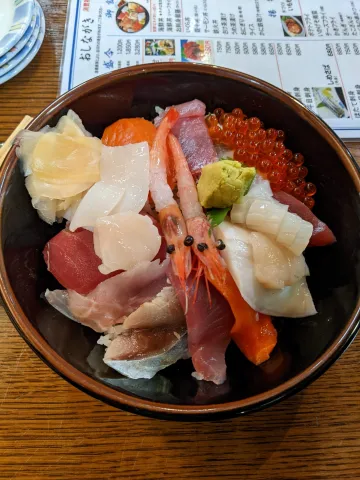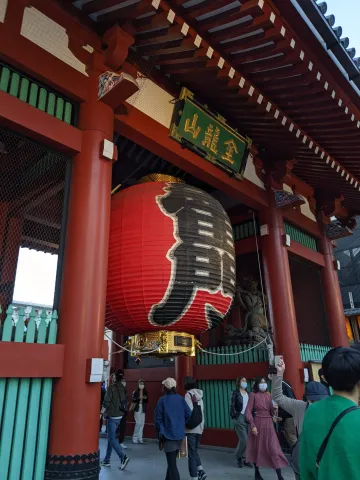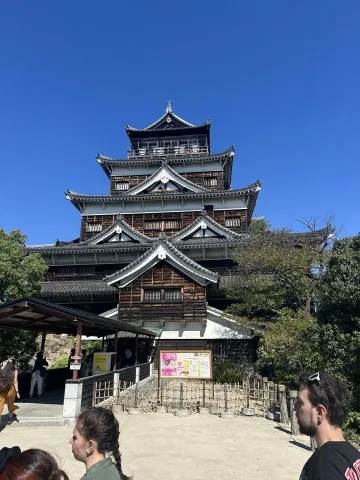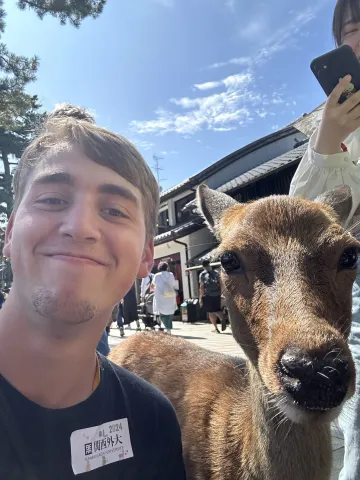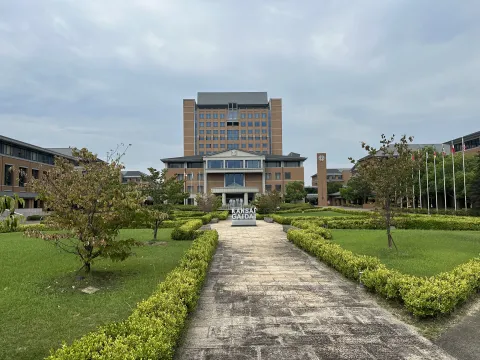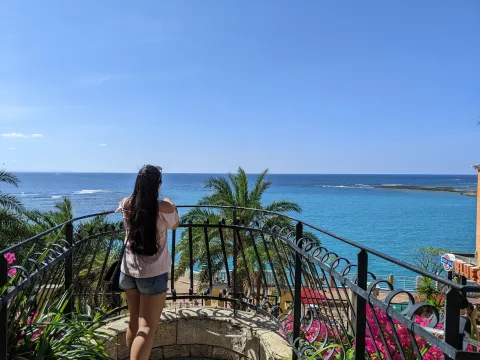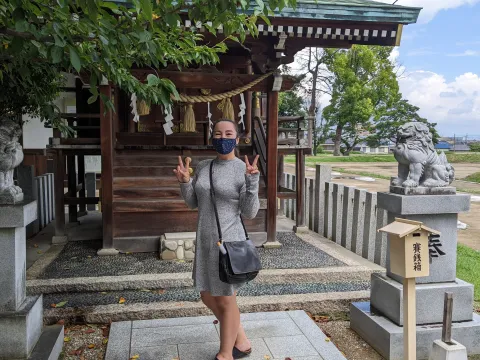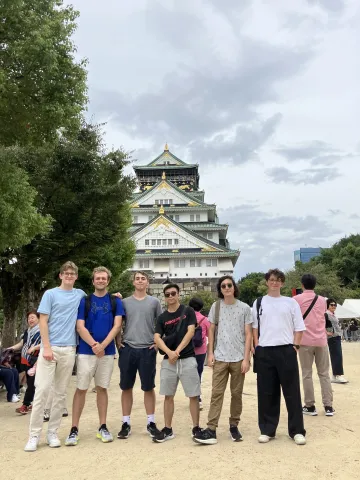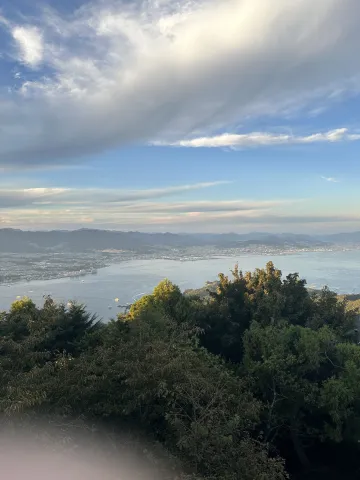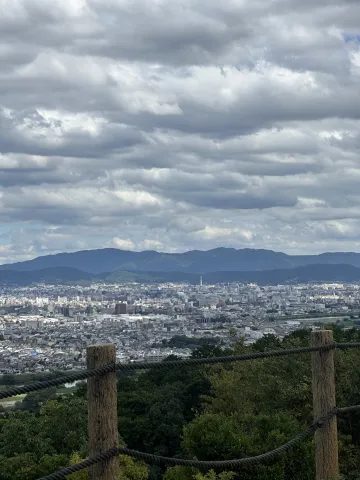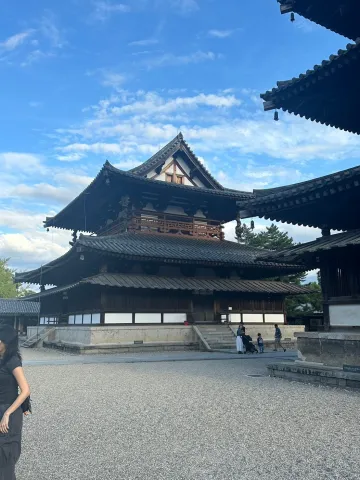Kansai Gaidai University
Kansai Gaidai University
Important Information
Semester Dates
- Fall: Early September - Mid December
- Spring: Early February - Late May
Language
- Courses are offered in English and Japanese
Website
For further information, visit the International Centre Office (SU060) or email outgoing@uleth.ca
About
Japan, an island nation located in East Asia, is renowned for its cultural heritage, technological advancements, and stunning natural landscapes. It boasts a unique blend of ancient traditions and modern innovations, with iconic attractions like Mount Fuji, historic temples, and futuristic cities like Tokyo.
Basic English is widely spoken throughout the country, particularly in major cities and tourist centers. Announcements on public transportation are frequently made in both Japanese and English, and signs generally include decipherable roman characters or an English explanation.
In Japan, there are many fascinating places that you can enjoy for free. These include such diverse attractions as beer museums, food galleries, hi-tech consumer electronics showrooms, cosmetics factories and television studios. With so many different places to visit there's bound to be something of interest for everyone.
Traditional cultural pursuits such as sado (Japanese tea ceremony) and ikebana (flower arrangement) are much more than simple pursuits in skills. They embody spiritual ways seeking the traditional values of wabi (elegant stillness) and sabi (antiquated elegance with calm).
Kansai Gaidai University is located in Hirakata City on the border, with easy access to Osaka, Kyoto, and Nara. Osaka is Japan's second largest business centre.
Hirakata is bounded by the Yodo River to the west, and the verdant Ikoma Mountains to the east. The area has been populated since ancient times, and thrived as the hunting grounds of nobles and aristocrats during the Heian period and as a staging post along the main road from Osaka to Kyoto during the Edo period.
With students attending six universities located in Hirakata, the city can now be regarded as a "student city".
Originally established in 1945 as a small, private language school in post-war Japan, the school today prospers as a private, non-profit institution with four distinct educational programs. Kansai Gaidai offers a complete range of university courses at undergraduate and post-graduate levels. The university also offers a special program called the Asian Studies Program, accommodating exchange students wishing to pursue Japanese language and Japan/Asian studies.
The two campuses of Kasai Gaidai are located in Hirakata city. As a university devoted to the promotion of international education, Kansai Gaidai recognizes the essential roles that human creativity, intelligence, and initiative play in the development of increased intercultural understanding.
Student life at Kansai Gaidai revolves around a variety of settings: classrooms, clubs, library, cafeterias, and student lounges, any of which can be the starting point for involvement in the Kansai Gaidai community. The local students are always up to meeting and interacting with international students. They are willing to enrich your experiences in Japan.
Students considering application for exchange to Kansai Gaidai must have a cumulative GPA of 3.0 or higher.
Student Q &A
What were the biggest cultural differences you experienced?
The language and communicating with locals.
What is the best form of transportation within the city?
In the city, there is an effective bus system to get you around, but it is also walkable.
What was your favourite place to visit within the city?
There is a Convenience store called Lawson about 5 minutes from the dorms, but the Train Station is the real great place.
Were there any special events, festivals, or holidays in the city you would recommend others attend? Or anywhere you travelled to that you loved?
Hirakata is 1 train away from Osaka and Kyoto, you can see so many incredible places within those cities. Himeji Castle, the Imperial Palace and Nijo-Jo Castle, among many more.
On average, what was the weather like?
Hot. It was high humidity most days through the summer and it only got below 10 Celsius by early-mid December.
Additional comments about the city?
Hirakata is a perfect quiet city with a foreign student party scene if you want to indulge. It is just close enough to major cities that they all become day trips.
Did you have a favourite course you would recommend to future students?
Professor Chang Booseung's course about the Pacific War was extremely fun to do.
Additional comments about your host university?
They were very accomodating and made a very enjoyable experience.
Please list the furniture that was provided in your on-campus dorm room.
Desk, Bed (single), Chair, Dehumidifier, Cabinet & Clothing storage.
How long did it take to travel from your accommodation to classes?
15 minutes
Do you have suggestions for future students who are looking for accommodation?
You do not need a bike to get between the two campuses, and the student dormitory is a great opportunity to meet students from across the world.
Which company would you recommend students purchase a sim card/e-sim through?
Airalo is a great E-Sim option, they have plans for several data amounts & several timeframes that are relatively cheap.
Do you have advice for how students should handle banking in your host country?
ATM's have a fee based on how much you take out each time that is constant with your amount. The key is with your own bank, which may have additional fees that aren't linked to how much you take out.
Please provide any additional suggestions regarding costs.
You don't have to empty your bank account to enjoy the trip, but I would have been more regretful if I did not do something because I was worried about the price (within reason, don't spend 2k on a dinner unless you think it's worth it).
What would you suggest students pack before leaving Canada if they are studying at your host university?
More warm clothing than cold clothing but not none, hobbies to do, NOT a PC.
Any additional advice for future students going to KGU?
Kansai Gaidai has many opportunities to connect with local students, from hanging with your RA's to weekly meetings with fun themes, as well as clubs to join.
What were the biggest cultural differences you experienced?
It's normal for children to walk by themselves and take the train themselves. Also, the humidity very different in Canada (i.e., Canada is dry).
What is the best form of transportation within the city?
Train can pretty much get you anywhere within Japan, of course with some exception (i.e., Okinawa). If you're within the city or your local area biking and walking is also perfect.
What was your favourite place to visit within the city?
GU (clothing store) and Hirakata Mall
Were there any special events, festivals, or holidays in the city you would recommend others attend? Or anywhere you travelled to that you loved?
In general, all around Japan there will be some sort of event. In Hirakata at Hirakata Park there was an event that I went to.
On average, what was the weather like?
Humid, usually around 10-25 degrees Celcius. If you go during the summer, be warned, it is very hot and the humidity doesn't make it better.
Additional comments about the city?
If you're not too much of an extroverted person, this Hirakata City gives a nice cozy feeling.
Did the university provide airport pickup upon arrival?
Yes
Did the university have a buddy program available?
No
Additional comments about your host university?
It is a very pretty campus. Also, the buddy program wasn't really a buddy program, it was more of a meet a friend like event.
Were the following provided in your on-campus dormitory?
- Bedding - Yes
- Shared kitchen - Yes
- Pots, pans, utensils - Yes
How long did it take you to travel to classes?
15 minutes
What company did you purchase a sim card/e-sim through?
I bought a sim on Amazon for 4 months (40$).
Any suggestions for packing before leaving Canada?
If you plan to buy clothes pack VERY light! Laptop (if applicable), if anything pack light, you will most likely buy a lot in Japan.
What were the biggest cultural differences you experienced?
Language and expression, specifically the indirectness of communication.
What is the best form of transportation within the city?
Train (京阪線)
What was your favourite place to visit within the city?
Jankara or Gotenyama shrine
Were there any special events, festivals, or holidays in the city you would recommend others attend? Or anywhere you travelled to that you loved?
Takamatsu is an incredibly beautiful place located in Shikoku. If you have the time and money to get there, it is 100% worth it.
On average, what was the weather like?
Fairly humid and warm
Additional comments about the city?
Hirakata is an incredible city with kind and understanding peoples that you are sure to get along with. I have personally made connections with people that I will cherish for a lifetime, and will soon be creating plans to reunite. The city is located in an incredibly convenient location within the Kansai region, which allows you to easily and quickly go to places of interest such as Kyoto, Osaka, Kobe, and Nara with little to no issues.
Did you have a favourite course you would recommend to future students?
Japanese Warrior with professor Shultz is an incredible course for anyone with interest in Japanese history and philosophy. I learned a lot from this course, even as someone who had previously taken Japanese history courses.
Additional comments about your host university?
Kansai Gaidai has great facilities that are well maintained and easy to access. The professors are all incredibly knowledgeable and easy to approach, which allows for an accessible learning environment
Do you have suggestions for future students who are looking for accommodations?
The dorms at YUI are a great option which allows you to meet people from across the globe and establish new connections.
How much cash would you recommend students bring when arriving?
ATM's usually come with a service fee of around 110-220 yen at most, so if you are comfortable with that, none is required before arrival.
Which company would you recommend students purchase a sim card/e-sim through?
Airalo e-sim
Do you have advice for how students should handle banking in your host country?
Taking out cash helps with reigning in spending and it is the most common form of payment in Japan.
Please provide any additional suggestions regarding costs.
Immediately buy a Iocal transportation card. It is super efficient and cost effective if you frequently use the train or bus.
What would you suggest students pack before leaving Canada if they are studying at your host university?
Temperatures only got as low as 5 degrees Celsius, so packing lighter clothing to save on space is recommended. Clothing is very inexpensive and well made, so if need arise for more clothing, it can easily and cheaply be bought.
What was your favourite place to visit within the city?
Ages Café
Were there any local festivals you would recommend others attend?
Kyoto Yokai Festival
On average, what was the weather like?
Sunny/warm
Any additional comments about the city?
You will do lots of walking!
Did you have a favourite course you would recommend to future students?
Anything with Motohashi 本橋先生 Or Tanaka 田中先生
Did the university have a buddy program?
No
Were the following provided in your on-campus dorm?
- Bedding - Yes
- Shared kitchen - Yes
- Pots, pans, utensils - Yes
How long did it take to travel from your accommodation to classes?
15 minutes
Which company would you recommend students purchase a sim card/e-sim through?
Rattan
Do you have advice for how students should handle banking in your host country?
Use a visa card. every store has places to take out cash using credit cards.
What would you recommend students pack before leaving Canada?
Towels. Pack light and leave lots of room for souvenirs.
What were the biggest cultural differences you experienced?
- Using public transportation everyday. In Canada I typically drive everywhere. At first, I was even sore from walking long distances everyday, but by the end of my exchange I was much healthier and happier.
- Japan is very safe. At first I felt uneasy about walking alone at night; however, I realized that almost every student does and after a few weeks I felt comfortable doing the same.
- I was shocked by the everyday social rules that everyone followed. It was very important to make lines and keep your space clean. In my dorm, failure to do so had serious consequences. This was stressful at first but eventually led to relaxation and a healthy environment.
What is the best form of transportation within the city?
Train
What comments do you have about Hirakata City?
The city is in a great location. It is in-between Kyoto and Osaka, which is perfect for day trips. It also has many cute cafes, a hospital, and is close to a central train station.
Did you have a favourite course you would recommend to future students?
I would recommend "East Asian Literature and Culture in Translation."
Do you have any comments about your host university?
Kansai Gaidai was a wonderful experience. I recommend it to anyone looking to complete an exchange in Japan.
Were the following provided in your on-campus accommodation:
- Bedding - yes
- Kitchen - yes
- Kitchen supplies (pots, pans, utensils, etc) - yes
How long did it take to travel from your accommodations to classes?
It was a 20 minute walk.
Do you have suggestions for future students who are looking for accommodations?
Stay at YUI.
Which company would you recommend students purchase a phone plan through?
I had a pocket wifi and an esim. I did not find my pocket wifi practical at all. I would recommend "Ubigi" as a helpful app for the esim.
Please provide any additional suggestions regarding costs.
I would suggest using the student discount for the bullet train.
Do you have any additional comments for future exchange students going to KGU?
If you have questions, email the coordinators at Kansai Gaidai as they are super helpful. Also take into consideration the time change when completing initial deadlines, all of them are in Japan time.
Program Information
KGU requires students to take a minimum of 4 courses. Exchange students take a minimum of 4 and maximum of 5 courses, and one must be spoken Japanese.
Courses in English
All courses in the Asian Studies Program are taught in English and designed for exchange students. To view a list of courses offered in the program click here. To view course syllabi, click here and choose a semester.
Language Courses
All students must register for a Spoken Japanese language class. Written Japanese is also offered, with availability depending on the students' written Japanese abilities upon arrival. For more information about Japanese language courses, view the links above.
Areas of study in the Asian Studies Program include:
- Art
- Business
- Communication
- Cultural Studies
- History
- Japanese Language Courses
- Law
- Literature
- Media
- Political Science
- Religion and Philosophy
Courses in the Asian Studies Program are each worth three credits (equivalent to one 3 credit U of L course).
Requirements
You are eligible for this exchange if you are:
- A full-time U of L student
- In at least the 2nd year of your program
- In good academic standing, with a GPA of 3.0 or higher
It is MANDATORY to obtain a Student Visa from the Consulate General of Japan in Calgary. There is an application fee of CAD $57 (2023).
Before applying for a visa, successful applicants to Kansai Gaidai must first obtain a Certificate of Eligibility (CoE) from the Osaka Immigration Office. Kansai Gaidai will apply for the CoE on behalf of successful applicants.
Visit the Embassy of Japan in Canada website for information about the visa application process.
Consulate General of Japan in Calgary
Phone: 1 (403) 294-0782
E-mail: consular@cl.mofa.go.jp
Website: www.calgary.ca.emb-japan.go.jp
Office hours: Monday to Friday 09:00–12:30 and 13:30–17:00.
All applicants must call the office to arrange an appointment to apply for a visa and submit all documents in person at the Consulate General of Japan at Calgary.
For detailed information about vaccination recommendations when visiting Japan, please visit the Government of Canada's website.
Expenses
- Cost: ¥320,000/semester (2023)
- Homestays allow students to immerse themselves in the Japanese culture and daily life. Placements are finalized during orientation at Kansai Gaidai.
- Not all families live close to the university. An average commute is one hour.
- Rooms are private and furnished. Washers/dryers, TVs, kitchen, etc. are shared with family members.
- Breakfast and dinner are provided by the host family on weekdays. Three meals are provided on weekends.
- Student demand for home-stay placements is sometimes higher than supply. Students requesting a home-stay may be placed in a dormitory. If this is the case, they are encouraged to take part in the Home Visit Program.
- Cost: ¥230,000/semester (2023), a refundable security deposit of ¥30,000 is required.
- Exchange students may stay in the Global Commons, containing about 50% local and 50% international students.
- All rooms are barrier-free single rooms equipped with a desk, bed, closet, book shelves, shoe box, small refrigerator, and air-conditioner. Internet access and linen service are available. Kitchens and dining areas are shared.
- Other facilities include a 24h study room, fitness room, karaoke room, and 24h computer room.
- Students may arrange for their own private accommodations, but this may be difficult and expensive given the housing shortage in Japan and some aspects of Japanese rental agreements.
- A security deposit is typically significantly more than a month of rent, and only 50% or less is typically refunded.
- The real estate agent's fee is typically equal to a month of rent.
- Apartments are almost always completely unfurnished.
Kansai Gaidai offers airport pickup service on specified dates at the Kansai International Airport (KIX) for all arrivals before 6:00 pm or at the Osaka Itami Airport (ITM) for all arrivals before 7:00 pm. The fee for the service is ¥6,000. Students who wish to utilize the service must provide their arrival information using the Gaidai-Link system before the deadline. For students who do not wish to utilize the service, Kansai Gaidai also provides directions to the university on their website.
In Hirakata City
Within Osaka, the most common mode of transport is by train. Various discount cards are available for buses and trains. For example, a pre-paid Kansai One Pass can be used on almost all major bus and train lines in the Kansai area. Bus services are operated by numerous bus companies, not only in big cities but also in regional towns. The bus fare varies depending on the bus company but it is usually around $2.50 for an inner-city ride.
Students going on an exchange pay regular U of L tuition and fees. For up-to-date tuition information, visit the U of L's Financial Services website.
It is MANDATORY for students to purchase Liability Insurance the Japanese National Health Insurance for their entire period of stay. Students are encouraged to also obtain Canadian insurance in case of events such as unexpected surgery or long hospitalization.
Japanese National Health Insurance Program
Exchange students must enroll in Japanese National Health Insurance.
The insurance premium will be charged from the date that you arrive in Japan. Although the actual premium depends on the city where the student resides, the average premium is approximately ¥2,000/month (2023). When visiting medical institutions, students will be exempt from 70% of medical and pharmaceutical fees by showing their National Health Insurance card.
The National Health Insurance does not cover normal childbirth, traffic accidents (when the assailant is clearly known), general health check-up, immunization, plastic/cosmetic surgery, etc.
The mandatory liability insurance plan covers up to ¥100,000,000 with a one-time ¥2,320 premium per semester. The insurance covers a variety of accidents.
For more information about average expenses, visit Kansai Gaidai's website.
|
Airfare |
CAD 2,000 |
return |
|
U of L Tuition |
See Fee Schedule |
|
|
Rent (dormitory or homestay) |
¥ 230,000-320,000 |
per semester |
|
Textbooks |
¥ 20,000 |
per semester |
|
Food |
CAD 100-200 |
per month |
|
Transportation |
¥ 70,000 |
per semester (homestay), varies depending on amount of personal travel |
|
Insurance |
¥ 2,000 | per month |
|
Visa |
CAD 57 |
Student Photos
